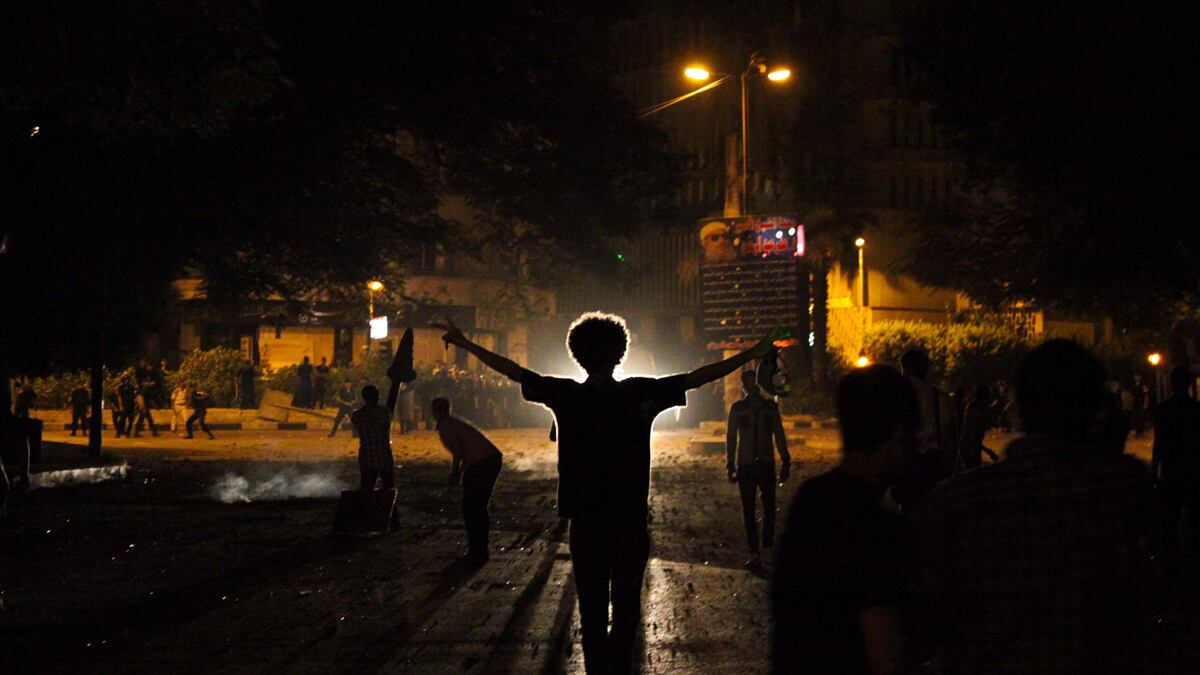In scenes reminiscent from the earliest and most volatile days of the Arab Spring, Egyptian security forces clashed with rock-hurling protesters, firing tear gas around the U.S. Embassy complex and in nearby Tahrir Square.
Dust-rich smoke plumes rose over the area as protesters used Molotov cocktails to ward off security attacks. More than a dozen people have reportedly been injured in the clashes, including several security officials. It was the third day of uprisings in the Egyptian capital. Protesters voiced anger over a low-budget film produced in the United States, which depicts the Prophet Muhammad unfavorably, as sex crazed and deranged, and places the character on trial. Any depiction of the prophet is a violation of Muslim beliefs.
Nearby stores, already reeling from months of slow business, closed their gates as shielded security forces clashed with fiery demonstrators. The Muslim Brotherhood and other groups have called for a peaceful mass demonstration against the film after Friday prayers in Tahrir Square. The protests, which began outside the U.S. embassy in Cairo on September 11, have spread to several countries in the region, including Yemen, Iran, and Libya, where four U.S. diplomats were killed in attacks on the consulate in Benghazi, including Amb. Christopher Stevens.
In Yemen, where popular protests last year toppled the country’s president of 33 years, Ali Abdullah Saleh, hundreds of protesters stormed the U.S. Embassy in Sana, scaling the fence, smashing windows and spraying graffiti outside its walls. They chanted “death to America!” as security forces sprayed tear gas to disperse the crowds. Yemen’s President Abd Rabbo Mansour Hadi said in a statement that he deeply regrets the attack on the embassy, and noted that the filmmakers are “demagogic groups.” He also said that “rowdy groups” seized this opportunity because the 2011 revolution weakened security forces, state-run Saba News Agency reported.
The U.S. Embassy in Yemen issued a statement on its website warning expatriates to avoid large gatherings and take all necessary security precautions.

Saudi Arabia, the spiritual center to the world's one billion Muslims, condemned the anti-Islam film and violent reactions against U.S. interests, in a statement read on state television.
“These Americans keep looking for trouble with their attacks on Islam,” said Egyptian Ashraf Mohammed, 19, a student and member of the Muslim Brotherhood from the Fayoum governorate. “Our religion is inside our hearts. If you hurt our heart of course it will make us angry.”
On the outside walls of the U.S. embassy in Cairo, protesters scribbled graffiti slogans of battle. “Take care America, we have 1.5 billion bin Ladens,” says one. “Khaybar, Khaybar ... O Jews, the army of Muhammad is coming,” another reads. (Khaybar refers to a fortress town inhabited by Jewish tribes in Saudi Arabia until its fall to Muslim forces in the seventh century).
“This is the end of our revolution,” said Ahmed Ali, who owns a small grocery store near to Tahrir Square. “These days there are too many people who want to cause trouble for no reason. These boys are looking for a fight and because of that we will all suffer.”
In a televised address Thursday, Egypt’s President Mohamed Morsi, a member of the Muslim Brotherhood, denounced the attacks on embassies but said that he supports peaceful protests.
“Expressing opinion, freedom to protest and announcing positions is guaranteed but without assaulting private or public property, diplomatic missions or embassies.” He also warned those who attacked the prophet Mohammed. In a separate statement on Wednesday, Morsi called upon the Egyptian Embassy in Washington to take legal action against the filmmakers, who include Los Angeles resident Nakoula Basseley Nakoula, as well as Florida pastor Terry Jones, who publicly threatened to burn the Quran in 2010, inciting deadly riots in Afghanistan.
Morsi is in Europe on his first official visit there since taking office. EU leaders offered Egypt more than one billion euros in aid and better trade, praising Morsi for offering reassurances on his "unwavering commitment" to democratic values and fundamental freedoms. European Commission President José Manuel Barroso said in a press conference Thursday that "Egypt can count on the European Union.”
But President Barack Obama was of a different mindset during an interview with Telemundo Wednesday, admitting that the longtime friendship with Egypt is in flux. “I don’t think that we would consider them an ally, but we don’t consider them an enemy,” he said. “Certainly in this situation, what we’re going to expect is that they are responsive to our insistence that our embassy is protected, our personnel is protected.”






